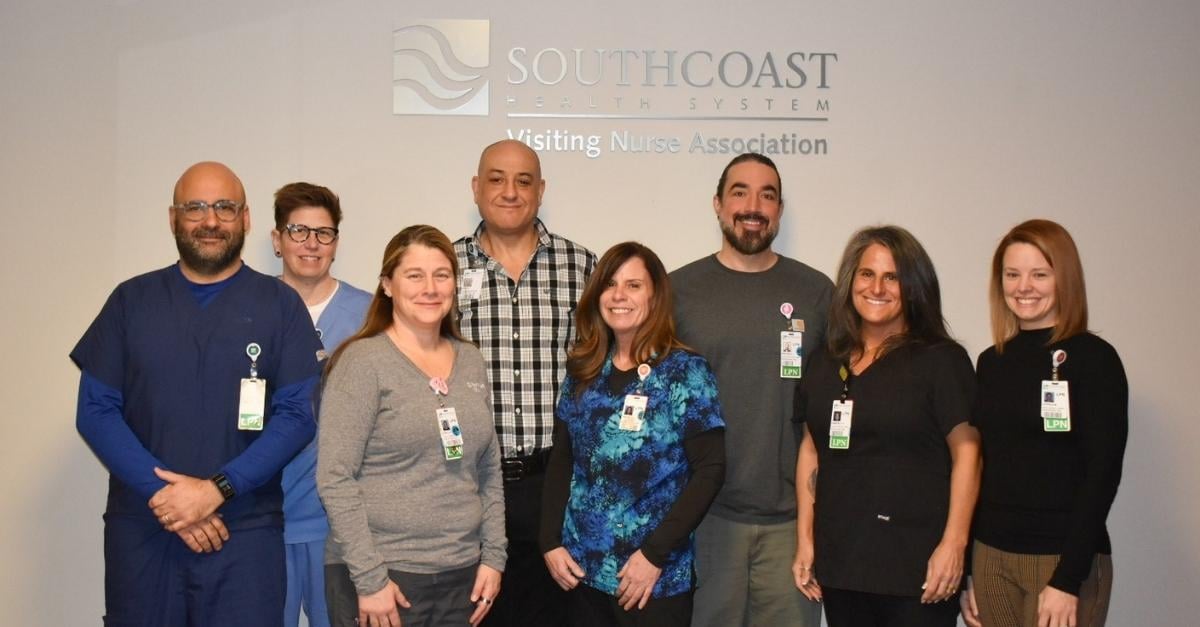Southcoast VNA saves an average of 4 in-home nursing visits leveraging virtual visits & remote patient monitoring with a 7% 30-day rehospitalization rate for 2,621 patients over the last 16 months
FAIRHAVEN, Mass. – The Southcoast Health Visiting Nurse Association (VNA) saved an average of four in-home nursing visits annually, and generated over $500,000 in cost savings, while achieving a 7% 30-day readmission rate for 2,621 high-risk patients over the last 16 months leveraging remote patient monitoring (RPM) and a virtual visit program.

With the goals of improving clinicians’ workload and patient care transition, the Southcoast VNA began their partnership with Health Recovery Solutions (HRS) for RPM in 2017. Patients enrolled in the program are monitored daily, with clinicians responding to risk alerts based on their reported vitals and symptoms. To quickly evaluate patients and address any concerns, providers can contact patients directly via a virtual visit or text messaging. The virtual visit program began in 2021 leveraging the videoconferencing feature of HRS for patients while on RPM.
This innovative care model replaces at least one in-person visit a week with a virtual visit, and the additional touchpoint has significantly improved physician-patient trust and communication, while decreasing care costs and staff workload by avoiding unnecessary in-home visits and exacerbations. The program can also incorporate a patients’ primary care physician in a virtual visit to meet the face-to-face CMS home health requirement.
“Our partnership with HRS and incorporating video visits into our daily routine has allowed us to provide care outside of the patients home as well as improve outcomes in term of hospitalization and cost savings,” says Jessica Magalhaes, Southcoast VNA’s Telehealth and Transitional Care Team Leader. “Having the tools to connect with a patient daily and monitor their vital signs closely has allowed many of our patients to remain at home with an improved quality of life.”
Our partnership with HRS and incorporating video visits into our daily routine has allowed us to provide care outside of the patients home as well as improve outcomes in term of hospitalization and cost savings. Having the tools to connect with a patient daily and monitor their vital signs closely has allowed many of our patients to remain at home with an improved quality of life.Jessica Magalhaes
Southcoast VNA’s Telehealth and Transitional Care Team Leader
In the last 16 months, from October of 2021 until January of 2023, the Southcoast VNA’s RPM program has achieved a low 30-day readmission rate at seven percent for 2,621 high-risk patients.
Southcoast VNA additionally offers a specialized RPM program for high-risk chronic care patients not enrolled in home health services. Patients identified were enrolled in the RPM program for a minimum of six months to help them develop self-management skills and reduce care costs for the health system and ACO.
The chronic care RPM program has also demonstrated incredible success throughout the last 16 months, averaging another low hospital admission rate of 3% for 988 patients, with a daily adherence and satisfaction scores each above 90 percent.
Beginning in 2002, the Southcoast VNA became an early adopter of telehealth and remote patient monitoring (RPM), launching a small program aimed at reducing hospital readmission for high-risk patients. In 2017, Southcoast partnered with Health Recovery Solutions (HRS), the KLAS-leader in remote patient monitoring, to expand their targeted patient populations and program objectives.
“Southcoast Health has always been an innovative and exciting partner. Improving patient care is at the crux of everything they do—whether it’s expanding to new patient populations or launching new care models—the impact on their community always comes first.” - Kimberly O’Loughlin, CEO of Health Recovery Solutions
Southcoast Health has always been an innovative and exciting partner. Improving patient care is at the crux of everything they do—whether it’s expanding to new patient populations or launching new care models—the impact on their community always comes first.Kimberly O’Loughlin
CEO of Health Recovery Solutions
By expanding their RPM partnerships across the health system, and developing new partnerships within their ACO to meet the needs of their patients, Southcoast has shifted the goals of its RPM program to address growing challenges in the healthcare industry—including staff retention and value-based care. In the coming months, Southcoast looks to develop new partnerships with health plans and providers that will collaborate with them to treat patients in need of the round-the-clock care offered by their RPM team.
![]()
About Southcoast Health
For more than 25 years, Southcoast Health has served communities across southeastern Massachusetts and Rhode Island as the largest provider of primary and specialty care in the region. The not-for-profit, charitable system includes three acute care hospitals – Charlton Memorial in Fall River, St. Luke’s in New Bedford (a Level II Trauma Center), and Tobey in Wareham – as well as a network of over 700 physicians, hospitalists, and midlevel practitioners.
Southcoast Health has established six Urgent Care Centers, two Cancer Centers, a Visiting Nurse Association, and numerous ambulatory facilities that ensure convenient access to services for 725,000 residents in 33 communities covering 900 square miles. In addition, the system partners with Acadia Healthcare to offer expanded resources at Southcoast Behavioral Health in Dartmouth.
With upward of 7,500 employees, Southcoast Health is the largest employer in southeastern Massachusetts, and one of the largest employers in the Commonwealth, according to the Boston Business Journal. More information is available online at www.southcoast.org.
About Health Recovery Solutions (HRS)
Health Recovery Solutions' (HRS) telehealth and remote patient monitoring solutions empower the nation's leading providers and payers to deliver care to patients across the continuum—reducing readmissions, optimizing clinician workflow, and improving patient satisfaction. HRS' disease-specific telehealth solutions are customized with educational videos, care plans, and medication reminders while also integrated with Bluetooth peripherals to engage patients in their self-management. HRS' mission is to create a new standard of care by providing advanced telehealth and remote patient monitoring solutions that facilitate behavior change and ultimately improve patient outcomes. To learn more about Health Recovery Solutions, visit healthrecoverysolutions.com or email marketing@healthrecoverysolutions.com.